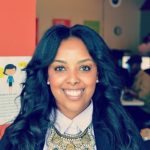
Alumni Member
Bethel Woldemichael
How did you become interested in your field?
I have always known what I wanted to dedicate my life to and as the years have gone by, the passion to help individuals and their health needs on a local and global scale has only intensified.
As the daughter of a man who dedicated his entire career to International Development, my family and I followed my father to over 25 countries and lived in 7 countries, many of which were developing nations such as Ethiopia, Vietnam, and Zimbabwe. Due to my upbringing, the health needs of people living in resource-poor settings became very apparent to me at a young age. My interest when applying to the Master of Public Health Program in the field of Health Promotion derived from my concerns of healthy inequities, social justice and systemic barriers in which many communities face.
A pinnacle point in my undergraduate studies at the University of Toronto Mississauga was in my third year when I took a Women and Gender Studies course: Women and Health taught by Dr. Branka Agic. This learning experience was an epiphany moment for me, as it was intellectually stimulating but more importantly it came closest to what I wanted to complete my Masters in. I was able to grasp a stronger sense of the social determinants that contribute to disparities in health, the health needs of women in developing nations and the urgency and need for public health professionals internationally.
What additional degrees or training do you have?
Honours Bachelor of Science degree from University of Toronto Mississauga and a Scientist Knowledge Translation Training certificate from the Hospital of Sick Children.
Tell us about any interesting projects you are working on.
I am currently working on a project called Thought Spot, which is a mobile application with a live map designed by students, for GTA students. The map “allows students to easily identify and access health and wellness services, and discover resources that are relevant to their experiences, situation, and location.” In this phase, we are using participatory action research (PAR) principles to plan, recruit and engage students from all over the GTA to drive the optimization of the Thought Spot platform.
What do you enjoy most about your current career position?
I enjoy the diversity in tasks and responsibilities in my current role as I am a part of the evaluation team and the Client and Family Education Services team. The duality in my role allows me to bring my evaluation lens along with my research experience. More importantly, my current position aligns with my values of compassion, care, healthy equity and social justice.
In what ways has your experience at the School had an impact on your career and who you are today?
My experience at DLSPH built on my concerns and knowledge in identifying, understanding and addressing the societal and personal determinants of health. I gained a better perspective of the pressing health issues, health disparities and health inequities that exist across the socioecological model (i.e. systemic level, community level) in Toronto and globally. In addition, since I have gained a first-hand experience in witnessing what chronic and infectious diseases can do to an individual, a family, a community, and a nation, DLSPH reignited my passions to be a part of the solutions through health promotion, advocacy and awareness.
What advice would you give to younger alumni or current students who aspire to follow a similar career path?
Be nimble and think outside of the box as public health is always changing and redefining itself. Also, to be proud of your achievements thus far, I would strongly encourage others to embrace the present and take moments to high five yourself!
What would you say to a prospective student who is considering the School?
I would say to follow your dreams, continue on the path that excites you most or grasps you at your most passionate moments. Once you know, explore your options, and speak with those around you – network of friends, family, and community.
I would also suggest doing some preliminary research on the program/stream, connecting with faculty, alumni and students and attending any open houses offered through the school.